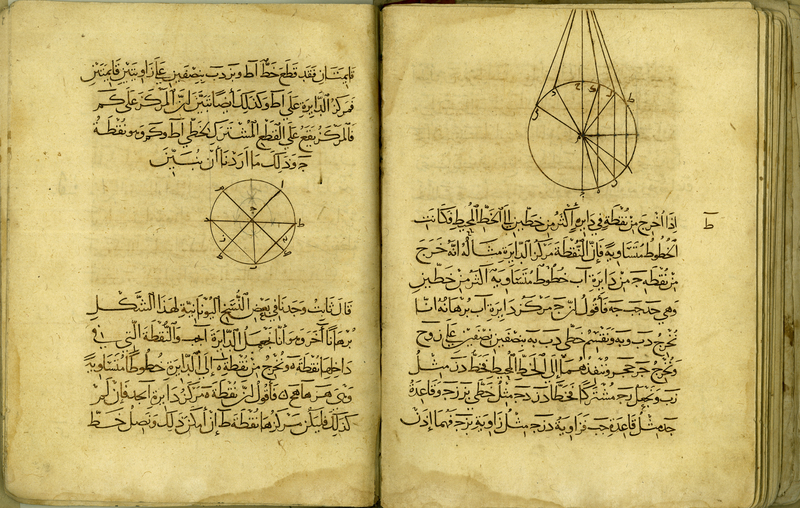
(Wikimedia Commons)
I like etymologies, so, naturally, my manuscript contains a few of them:
Few readers are surprised, probably, to learn that the name Sahara is Arabic (it means “deserts”), but the extent of our debt to the Arabs in the field of navigation and geography is shown by such Arabic terms as nadir, zenith, and azimuth, which still form an important part of those disciplines in our own language. Even weather terms like monsoon (mawsim, “season”) and scirocco—probably more familiar as the name of an automobile than in its original meaning of “the east wind” (sharqi)—come to us from the Arabs.[1] (The same Arabic term for eastern, sharqi, is the source for the name by which the Crusaders called their Muslim opponents in the Middle Ages: Saracens.)[2]
In the physical sciences, the Arab Ibn Haytham came to an essentially modern view of the nature of human vision in the tenth century by rejecting the incorrect views of Euclid and Ptolemy. (The question of how external objects come to form images within our minds is a very difficult one. The solution is not at all obvious.) Ibn Haytham’s work on the principles of optics also led him to a theory of what makes rainbows. In the thirteenth century, a scientist by the name of Kamal al-Din concluded, correctly, that the speed of light, although great, cannot be infinite. (We know this now, but, again, it is hardly obvious.) Our term alchemy furnishes an important clue to the connection of that discipline, and of chemistry in general, with the Arabs. The term al-kimiya is the Arab word for both alchemy and chemistry. (The “al-” prefix is simply the article the. We have borrowed it in Arabic-English words like alfalfa and albatross and alcatraz.)[3] As Arabic chemical treatises began to enter Western languages, so, too, did items of Arabic chemical vocabulary such as alembic, alkali, benzene, camphor, elixir, talc, and talcum.[4] Ironically, the word alcohol also comes to us from the Arabs—most of whom, as Muslims, do not drink “alcoholic” beverages. In Arabic the word al-kohl (“the powder”) refers to a substance known in English as antimony or even, borrowing the Arabic term directly, as kohl; it is commonly used by Arab women as a cosmetic, to darken their eyelids.
[1] It has even been argued that our word “typhoon” comes from Arabic tufan (“flood,” “inundation,” “deluge”), but I think this must be rejected.
[2] I’m tempted to suggest, for the benefit of fellow fans of J. R. R. Tolkien’s trilogy The Lord of the Rings, that the undignified nickname given at the end of the story to the fallen wizard Saruman—”Sharkey”—may also be related to the Arabic sharqi, “Easterner.” After all, throughout the trilogy “the West” is good and “the East” is bad. Tolkien was a medievalist, and his good friend C. S. Lewis indisputably borrowed the Turkish word arslan, “lion,” as the name of the hero of his Chronicles of Narnia. Other commentators have claimed that Sharkey derives from the Orkish sharhu, “old man.” Both theories may be right.
[3] In terms of their origin, albatross and alcatraz are the same word. Both go back to the Arabic al-qadus, meaning “waterwheel bucket,” “scoop,” or “waterbearer.”
[4] Some have suggested an Arabic etymology for the word lava, but this appears doubtful.
Posted from Laie, Oahu, Hawai’i












